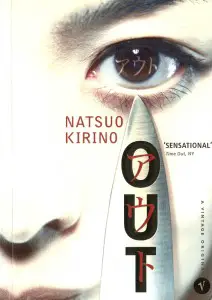 When, in 1998, Natsuo Kirino published Out (or Auto, in Japanese), her third novel, the Western world was slow to react. Although the novel was welcomed with great reviews by the Japanese and even went on to win the Grand Prix for Crime Fiction, Japan’s top mystery award, an English translation never happened until 2004, when Vintage Books had Stephen Snyder translate it. This was not late, but very late, as, by this time, Kirino’s second novel, Soft Cheeks (Yawarakana hoho), won the Naoki Prize for literature in 1999.
When, in 1998, Natsuo Kirino published Out (or Auto, in Japanese), her third novel, the Western world was slow to react. Although the novel was welcomed with great reviews by the Japanese and even went on to win the Grand Prix for Crime Fiction, Japan’s top mystery award, an English translation never happened until 2004, when Vintage Books had Stephen Snyder translate it. This was not late, but very late, as, by this time, Kirino’s second novel, Soft Cheeks (Yawarakana hoho), won the Naoki Prize for literature in 1999.
By the time English-language readers had the chance to read Out, the Japanese had already made it into a movie adaptation (2002, Dir. Hirayama Hideyuki), though the critics’ reception was not anywhere near to the book’s. Natsuo Kirino (b. 1951 as Mariko Hashioka) has ever since become one of Japan’s most established women crime writers and the dark perspective she has brought in her fiction has addressed grave socio-economical issues that have somehow been ignored by previous Japanese writers.
Out deals with the interconnected lives of four women who work on the gruesome nightshift at a food processing factory, where they do the physically exhausting and mentally debilitating job of preparing box lunches at the assembly line. In the factory, the group of four works well as a team, thus making their job a more tolerable one. But, their bondage will soon see a drastic change when one of the women strangles her husband and the other three friends dismember the corpse and dispose of it all around Tokyo suburbs. This unthinkable event challenges each of the four women both mentally and emotionally, and soon enough, their deed catches up with them.
The reasons behind the killing and the dismembering rest deep inside each woman’s personal and family life. Masako Katori, the “leader” of the four and the one who comes up with the idea of cutting up the body, although in a much better financial situation than the other three, is stuck in a household where the husband wants to have nothing to do with the wife and the son refuses to speak to both parents. Yayoi Yamamoto is a good-looking mother of two who has to deal with her abusive husband on a daily basis. But, when he spends all their savings on gambling and a high-class prostitute, Yayoi looses control and strangles him with her own belt. Basically, she is the one who triggers the enormous changes that, together with her three friends, their lives undergo.
As with all cliques, this one also had a pariah in the person of Kuniko Jonouchi, a fat woman obsessed with her unappealing appearance, which she tries to compensate with expensive clothes and a car her salary at the factory cannot pay for. She becomes involved in the dismembering of Yayoi’s husband in the hope of making some extra money and thus be able to meet her next payment in a long line of debts that sustained her abortive lifestyle. Yoshie Azuma, also known as “Skipper” for her effectiveness at the assembly line, is the oldest and most hopeless of the four. A widow, she struggles financially to send her teenage daughter to school and look after her invalid mother-in-law whom is bound to bed partly paralyzed.
For Yoshie and Kuniko, the dismembering of the body becomes a financially viable deal, as Yayoi pays them a handsome lump of money for their “services.” Instead, for Masako and Yayoi, the dismembering and the murder set them free from their lives as slaving housewives. While Yayoi finds a new purpose in life and plans to move and make the most out of the insurance money, Masako feels liberated from all societal and family constraints that until then had her chained to the role as the woman in the family.
But, of course, things don’t go as planned and the four women betray, blackmail and, eventually, abandon each other in order to save their own skin. On top of that, a scrupulous loan shark and a vicious ex-convict discover their secret and pursue their own agenda.
With its share of violence, graphic descriptions of the dismembering, rapes, and murders, Natsuo Kirino’s Out is not a novel for the faint-hearted. It is a hard-boiled crime novel that distinguishes itself from the noir genre by the sense of hope that imbues its ending. Although nobody escapes “unpunished” – in one form or another -, we do get to see the light at the end of the novel and the readers are made to believe that all the hardships and tribulations were not in vain.
Apart from being a great read with a great story, Out by Natsuo Kirino can also be considered a barometer of contemporary Japanese society, with all its ugliness and unfairness. Major social and economical problems are tackled, among which the Japanese men’s sexual obsession with schoolgirls, the role of women in society, and the racisms of “half-breeds” are among the most obvious.
Visit Natsuo Kirino’s bilingual website (Japanese-English) here.
